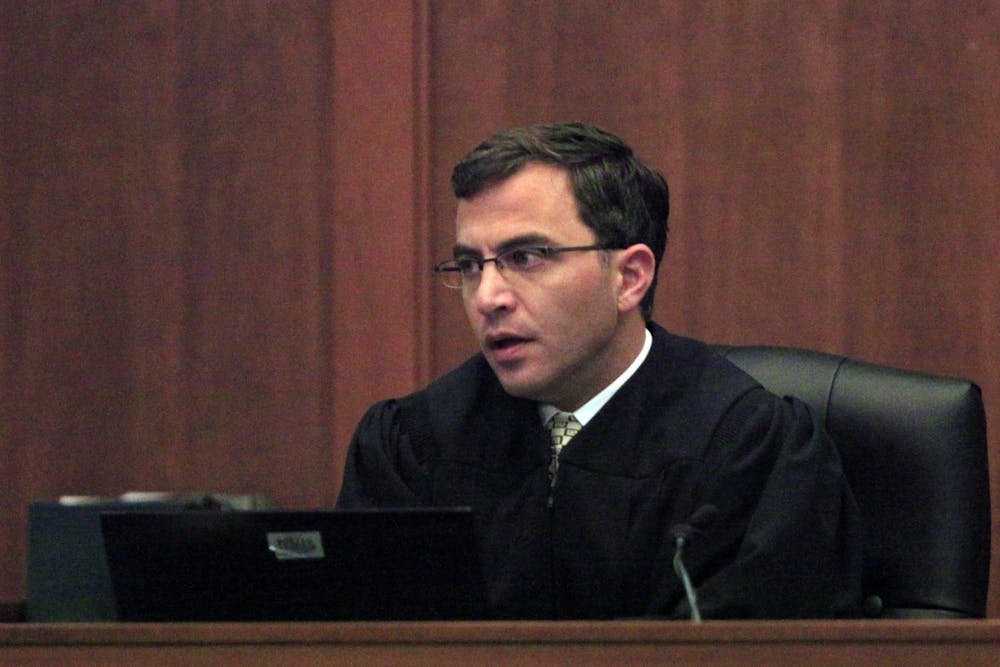The Silent Sam settlement
Superior Court judges in North Carolina typically rotate every six months within their division, but are usually unassigned on short holiday weeks. All Superior Court judges were unassigned for the week of Nov. 25 because of Thanksgiving.
Baddour has mostly been operating in Caswell and Rockingham counties during the fall session of 2019. However, when the Sons of Confederate Veterans filed suit against the UNC System on Nov. 27, Baddour was not bound to any particular jurisdiction and was free to travel to Orange County.
Duke law professor Kathryn Bradley said nothing about the case indicates there’s a clear-cut violation of judicial conduct, and that responsibility typically rests with the judge in deciding whether or not to recuse themself if the appearance of a conflict of interest arises.
“He also has an obligation on his own to not do anything that creates the appearance of impropriety,” Bradley said.
When the consent judgement in the Silent Sam settlement was stamped, about seven minutes had passed since the complaint by the Sons of Confederate Veterans had been stamped. The system’s response was stamped one minute after the initial complaint.
In total, the complaint, the system’s answer and the consent judgement make up over 70 pages of nuanced legal writing, not including the exhibits. Procedurally, the actors involved enacted the complaint into a $2.5 million payout to the SCV in less than 10 minutes.
“I’m also certain that they went to him specifically because of his connections,” Bradley said. “So that once they had the settlement done and it needs to be filed, they didn’t have to waste any time. They could just get him to sign it.”
Attempts by legal actors to find a friendly judge are not a notable occurrence in N.C. and alone don't indicate a code violation, Bradley and other attorneys said.
Executive Director of the North Carolina Judicial Standards Commission Carolyn Dubay said she can't answer questions about specific instances, but pointed toward a 2015 formal advisory opinion for information on how the courts recommend dealing with situations where familial conflicts of interest might be at play.
The opinion says judges have no duty "to tender a recusal based solely upon a distant familial relationship."
Outside counsel
To get the day's news and headlines in your inbox each morning, sign up for our email newsletters.
The UNC System needed permission from the governor or attorney general to use outside counsel in the SCV lawsuit. On Nov. 25 the chief deputy attorney general wrote a letter to the governor’s office, saying it would be impractical for his office to provide representation. He recommended Ripley Rand of Womble Bond Dickinson be contracted to represent the UNC System.
“It is our understanding that the legal fees and expenses will be paid through non-state appropriated funds and that a cap of $125,000 for this matter has been established,” Chief Deputy AG Alexander Peters said in the letter.
Womble Bond Dickinson represented the UNC System in the SCV lawsuit and conducted an investigation into the situation at East Carolina University in the fall, when the former interim chancellor was fired after a night out drinking with students.
Rand was formerly a N.C. Superior Court Judge and a U.S. attorney. His Womble Bond Dickinson biography page says "Ripley offers unique insights into the way government agencies approach investigations and regulatory issues."
In 2018, Rand and Baddour gave a joint presentation at the UNC School of Law’s Festival of Legal Learning called “View from the Courtroom: Ethics and Professionalism.”
A Womble Bond Dickenson press release said the session would "offer an interesting and amusing look at important rules of professionalism, ethics and general rules of practice, including interactions with the court, opposing counsel and witnesses."
Rand’s father Tony is the former majority leader of the N.C. Senate, who was in office at the same time Baddour’s uncle Phil was serving as a state senator representing Lenoir and Wayne counties.
Tony Rand donated money to a committee set up in 2006 to keep Baddour in office as Superior Court judge, as did Dean Smith and a list of other important UNC figures and administrators.
Allen Baddour, his brother and Ripley Rand have not responded to repeated requests for comment from the DTH via phone and email since Dec. 12.
Reporting contributed by Director of Investigations Charlie McGee.
university@dailytarheel.com



